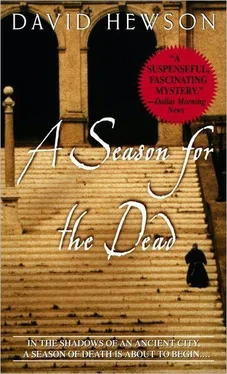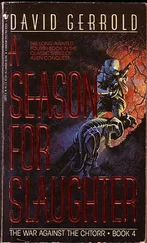David Hewson - A Season for the Dead
Здесь есть возможность читать онлайн «David Hewson - A Season for the Dead» весь текст электронной книги совершенно бесплатно (целиком полную версию без сокращений). В некоторых случаях можно слушать аудио, скачать через торрент в формате fb2 и присутствует краткое содержание. Жанр: Старинная литература, на английском языке. Описание произведения, (предисловие) а так же отзывы посетителей доступны на портале библиотеки ЛибКат.
- Название:A Season for the Dead
- Автор:
- Жанр:
- Год:неизвестен
- ISBN:нет данных
- Рейтинг книги:3 / 5. Голосов: 1
-
Избранное:Добавить в избранное
- Отзывы:
-
Ваша оценка:
- 60
- 1
- 2
- 3
- 4
- 5
A Season for the Dead: краткое содержание, описание и аннотация
Предлагаем к чтению аннотацию, описание, краткое содержание или предисловие (зависит от того, что написал сам автор книги «A Season for the Dead»). Если вы не нашли необходимую информацию о книге — напишите в комментариях, мы постараемся отыскать её.
A Season for the Dead — читать онлайн бесплатно полную книгу (весь текст) целиком
Ниже представлен текст книги, разбитый по страницам. Система сохранения места последней прочитанной страницы, позволяет с удобством читать онлайн бесплатно книгу «A Season for the Dead», без необходимости каждый раз заново искать на чём Вы остановились. Поставьте закладку, и сможете в любой момент перейти на страницу, на которой закончили чтение.
Интервал:
Закладка:
Costa blinked at the image on the wall. It looked alive. If he tried, he thought, he would hear the assassin’s breathing, feel the strength of the light pouring out from the canvas, trying to shed its redeeming Grace on them all.
Then a familiar face, half lit by the yellow electric lamps, pushed between them.
“Where the hell is he?” Falcone demanded, snatching the gun away from him. “Denney? What have you done with the bastard?”
The people he called should have been here now. He could hear someone else moving through the darkness. They needed more light than this single wan pool of yellow in one corner of the nave.
“I never saw him,” he replied honestly.
“One way in, one way out,” Falcone said. “For Christ’s sake. Denney knew this place like the back of his hand. He’s gone. He must be gone.”
Costa said nothing, trying to think. One minute, she said. Just a little time to talk and to keep him safe. Although they must, he now realized, have spoken already that day. Was there really anything else left to say?
“And you…” Falcone’s finger jabbed into his shoulder. “You just can’t stay away, can you?”
“I think, sir,” he replied, “you should consider your position.”
He looked into Falcone’s cold, bleak face. “You can’t carry on with this now. It’s bound to come out.”
Falcone shook his head. “What do I care about my position? To hell with it…”
Without warning he snatched a pair of handcuffs from his pocket, slammed one end on Gino Fosse’s wrist and locked the other to the iron railing. Costa looked into Fosse’s eyes. He was scared.
Falcone took Costa by the arm, peered closely into his face. “This bastard killed your partner. We’re walking away, kid. We’re done with this mess.”
The painting shone at him from the wall. Nic was unable to take his eyes off the figure in the background: Caravaggio himself, watching the murder which came from his own imagination, pitying the victim bleeding on the ground, pitying too the assassin led by fate to be the instrument of his death.
Falcone was dragging him now, by the arm, away from the scene. He struggled.
“Jesus!” Falcone threw Costa against a pillar, and snarled into his face, “I want you out of harm’s way, Nic. I don’t want any more dead men sitting around in my head.”
“No,” Nic Costa said softly. “I can’t let this happen.”
There were more bodies moving. Maybe they were the people Falcone expected. Maybe someone else. Nic thought he heard Teresa Lupo’s voice rising in the clamor. From somewhere a camera flashed. People were shouting. On the far side of the church a set of lights suddenly came on. Banks of bulbs followed them, marching around the ceiling as someone found the switches.
Costa looked at Falcone. The inspector’s bright eyes were darting around the church, trying to make sense of it all.
“This has got to stop,” Costa said, pushing himself out of Falcone’s grip. He fought free with a sudden jab, then raced the few yards to Gino Fosse. They were there. Two men. He pushed in front as they closed in on Fosse, raising their hands, guns gleaming in the wan light. He fought to take his eyes off the figures on the wall: the stricken man, his white tunic red with blood, the furious, naked attacker.
There was a noise that could have been the angry, leaden sky outside, a burning flash of bright light so intense it seared a raw, sharp pain somewhere behind his eyes. Nic Costa stared at the image on the wall: a bearded young man, watching in agony and amazement the bloody, vivid scene he had created. Then the face faded and with it the bright, life-giving light.
Fifty-Nine
Leo Falcone had two appointments in his diary that chill October day.
One was mandatory. For the second he would be an uninvited, unwelcome guest.
Disciplinary proceedings always left him cold. This was his third appearance before the tribunal in twenty-five years with the force. He knew what was required: an admission of some limited form of guilt, a display of penitence, the silent acceptance of a formal token of reproof. Perhaps they would dock his pay or make him attend some course of “retraining.” It was possible that he would be demoted, though he believed that unlikely. The Questura was scarcely overflowing with experienced officers to take his place.
Falcone’s position was plain. Whatever else had gone wrong, Gino Fosse was dead and the city rid of a vicious, psychotic killer. He had lost officers to this madman. His team had worked day and night trying to bring him to justice. Denney may have escaped, along with his daughter. There was more bloodshed than anyone wanted, even, he privately believed, those who initiated Fosse’s game and made its existence known to official quarters when it suited them.
But none of this could be easily laid at his door. The investigation they had ordered found no evidence of collusion among himself, the Vatican and the criminal parties who had gathered at San Luigi dei Francesi to kill the fleeing cardinal and his wayward son. There was talk in the wilder parts of the papers about a cover-up. The last, snatched pictures of the shooting in the church, taken by the woman journalist Nic Costa had sent there, continued to do the rounds. The two gunmen had escaped. They would, Falcone knew, never be found.
So be it. This wasn’t the first time the authorities had acquiesced in order to forestall a greater furor. Given the nature of Roman politics, he doubted it would be the last. And the media had short memories. There would soon be another scandal to occupy them, another face to sell more papers.
The hearing lasted ninety minutes. He walked out with a reprimand.
They had been persuaded by his argument that a conspiracy, if it existed, and he felt sure this was impossible, could only have begun over his head. They were moved by his genuine grief for his lost men. They were willing to give him the benefit of the doubt. This time, anyway.
At the end, after announcing a verdict which had clearly been decided before he entered the room, the commissioner led him to the door, taking his arm. “None of us is untouchable these days, Leo,” he said. “We live in changed times. Take care. I can’t save you again.”
Falcone didn’t want to look into his eyes. Maybe the man would see the bitter amusement lurking there. Had Falcone fallen, the commissioner would have followed not long after, and they both knew it.
“I understand, sir,” he replied, and walked down the corridor, thinking of what lay ahead.
For the sake of form—to let them know he was still in harness, his power undiminished—he spent an hour in his office, taking reports concerning the stabbing of a tourist who made the mistake of hustling for dope at the station. At midday he put on his coat and left the station. He could not, in all conscience, avoid what came next.
The crematorium was off the Via Appia Nuova, not more than a mile and a quarter from the Costa family home. He watched from his car. There were perhaps twenty mourners, mainly men, in dark suits. A tall woman in overelegant mourning clothes was pushing the figure in the wheelchair. Falcone sat listening to the radio for thirty minutes, thinking about the ceremony inside. It was a myth, a ritual. As a young cop he’d been called to a fatal accident at a crematorium once and come to understand the way they worked. This was a mechanical process. Messy, imperfect. It could be anyone’s ashes you walked away with. No one would know. No one, if they were honest enough to admit it, really cared about detail. This was a dumb show to ease the grief of those still alive. Details hardly mattered.
The distant doors opened and they came out again, leaving in a slow procession of black cars. He followed them back to the farmhouse, parking opposite the drive, just out of sight. It was three hours before the last had left. Falcone got out of his car and looked down the drive. There was just the woman now. And the figure in the wheelchair.
Читать дальшеИнтервал:
Закладка:
Похожие книги на «A Season for the Dead»
Представляем Вашему вниманию похожие книги на «A Season for the Dead» списком для выбора. Мы отобрали схожую по названию и смыслу литературу в надежде предоставить читателям больше вариантов отыскать новые, интересные, ещё непрочитанные произведения.
Обсуждение, отзывы о книге «A Season for the Dead» и просто собственные мнения читателей. Оставьте ваши комментарии, напишите, что Вы думаете о произведении, его смысле или главных героях. Укажите что конкретно понравилось, а что нет, и почему Вы так считаете.












